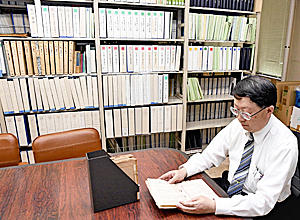70 years after Matsukawa train derailment, archive strives to preserve vital documents(松川事件70年...風化と闘う 記録劣化に危機感)

FUKUSHIMA -- Seventy years have passed since a fatal train derailment in the Matsukawa area of Fukushima city, which led to what can be regarded as the largest case of false accusations in the postwar era, with 20 people found guilty before eventually being acquitted.
On Aug. 17, 1949, a passenger train derailed and overturned, killing three train crewmen. This accident is known as the Matsukawa Case (see below).
The memory of the incident is fading, as 18 of the 20 former defendants have died. Although surviving people involved in the case are getting quite old, they have a warning about the environment that led to the false accusations and are trying to pass their memories on to future generations.
福島市松川町で列車が脱線、転覆し乗務員3人が死亡した「松川事件」は17日、発生から70年を迎えた。事件で逮捕、起訴された20人が最終的に全員無罪となり「戦後最大の冤罪事件」とも呼ばれた。事件に直接関わった関係者の高齢化が進み、元被告20人のうち18人が亡くなるなど、事件の風化が進んでいる。70年の歳月を経て、残された関係者は冤罪を生んだ社会に警鐘を鳴らし、その記憶をさらに後世に伝えようとしている。
"Criticizing a trial itself was epoch-making at the time. The Matsukawa Case set a precedent in society that allowed people to say, 'The court ruling is wrong,'" said lawyer Yusaku Tsurumi, 85, a counsel of former defendants who filed a lawsuit after they were found not guilty seeking redress from the state. He stressed the significance of the case, while looking back on these 70 years.
「当時、裁判を批判すること自体が画期的なことだった。公然と『裁判が間違っている』と言える社会の風潮が生まれた。その先駆けが松川事件だった」。元被告らが無罪判決後に起こした国家賠償請求訴訟で、専従の担当弁護人を務めた鶴見祐策弁護士(85)は70年を振り返りながら、事件の意義を強調した。
As the Matsukawa Case trials proceeded, ordinary citizens became suspicious about the trial and investigation of the case, spreading nationwide a call for a fair trial.
Tsurumi was one of those who felt the tangible change of the times -- when not only the people concerned but also public opinion changed society.
被告らの裁判が進む中で、一般市民が裁判や事件の捜査を疑い、「公正な裁判」を求める動きが全国に広がった。鶴見弁護士は当事者だけでなく、多くの民意が社会を変えていった時代の変化を間近で感じ取った一人だ。
With the number of people involved in the case dwindling, court documents and letters written by former defendants have become precious relics of the case.
Fukushima University -- which stores related documents in its Matsukawa Case Reference Library -- is working to strengthen its storage and management system of the documents.
事件の当事者が少なくなる中で、裁判資料や元被告らの手紙などは貴重な事件の"記憶"だ。資料を保存する「松川資料室」がある福島大は、管理運営体制の強化に取り組んでいるが、課題も多い。
So far, more than 100,000 documents related to the case have been collected in the archives. Some have been collected by the university, while many other materials were entrusted to it by participants in the movement against false accusations who asked the library to pass them on to future generations.
これまでに資料室に集められた事件の関係資料は10万点を超える。福島大が収集した資料もあるが、松川事件の冤罪(えんざい)を巡る運動の参加者らから「後世に残してほしい」と"託された"資料も数多く所蔵されている。
"Some paper documents have severely deteriorated due to aging. The mission of the archives to pass on materials to future generations is under threat," said Prof. Toshio Hatsuzawa at Fukushima University, who became the first chief of the library last year.
昨年、初代室長に就いた福島大の初沢敏生教授(57)は「経年劣化で限界を迎える紙資料が出てきている。資料を後世に伝える資料室の使命が脅かされている」と危機感を抱く。
Because paper at that time was highly acidic, if these documents are left untreated, "They will disappear into dust," Hatsuzawa said.
"If such important materials are further damaged, the records can't be handed down to future generations. Thus, preservation of the documents is an urgent task," he said.
初沢教授によると、当時の紙は酸性度が高いため処理をしないまま放置すると、「ちりとなって消えてしまう」という。「重要資料の傷みが進むと記録の継承ができなくなる。資料の保存処理が急務だ」と課題を挙げる。
Fukushima University has carried out preservation treatment for some of the documents, including the evidence that led to the 20 defendants' not-guilty verdicts. It also plans to carry out similar preservation for remaining important documents, but has not done so due to the significant cost involved.
福島大は、元被告20人の逆転無罪を決める証拠など、一部の資料について保存処理を実施。残る多くの重要資料についても処理を行う方針だが多額の経費が必要となるため、対応できていないのが現状だ。
In 2017, a nonprofit organization comprising the university and supporters embarked on efforts to raise public interest in the Matsukawa Case, aiming to add the case to UNESCO's Memory of the World list. The registration was not granted when applied for in 2017, as the case was not up to the standards. They are preparing to apply for the registration again.
2017年には再び松川事件に対する関心を高めようと、福島大や支援者らでつくるNPO法人が中心となり、ユネスコの「世界の記憶」(世界記憶遺産)登録に向けた取り組みも動きだした。同年の申請では「基準に満たない」との理由から登録は実現しなかったが、再申請の準備も進めている。
Matsukawa Case:A local train derailed and overturned between Kanayagawa and Matsukawa stations on the Tohoku Line in Fukushima, killing three train crewmen early in the morning of Aug. 17, 1949. A total of 20 people, including labor union members of Toshiba Corp. and the now-defunct Japanese National Railways, were arrested and indicted on charges of causing death by overturning the train. In the trial at the Fukushima District Court, all the defendants were found guilty, with five sentenced to death. However, all of them were eventually acquitted after the Supreme Court sent the case back to the lower court.
( Translated by The Japan News )
松川事件 1949年8月17日未明、福島市の東北線金谷川―松川間で普通列車が脱線、転覆し乗務員3人が死亡した事件。国鉄と東芝の両労組組合員ら計20人が逮捕、列車転覆致死罪で起訴された。一審福島地裁では5人が死刑など、全員が有罪判決を受けたが、最高裁が差し戻して最終的に全員が無罪となった。
【 2019年8月15日付・福島民友新聞掲載 】
- Futaba Post Office reopens after 13 years(双葉郵便局、13年ぶりに再開)
- Craft sake brewery to make unmanned station more welcoming(無人駅の「クラフトサケ」醸造所がお出迎え)
- New Kitakata ramen developed to appeal to foreign tourists(訪日客向けの喜多方ラーメン開発)
- Aizu-Wakamatsu students come together with teahouse project(会津若松の生徒、茶室プロジェクトに集結)
- New hotel to be symbol of reconstruction(復興のシンボルとなる新ホテル)
- Radiation-resistant cameras to be produced in Fukushima(耐放射線カメラ、福島県で生産へ)
- International flights to Fukushima to resume after 13-year hiatus(福島の国際定期便、13年ぶり再開へ)
- Fukushima association to create base for parents of children with disabilities(障害児の親へ拠点作り)
- Real shell mound from Jomon period goes on display in Minami-Soma(南相馬で縄文のリアル貝塚展示)
- Japanese man opens restaurant to provide free meals to residents of war-hit Ukraine city(日本人男性が戦禍のウクライナに無料レストラン開店)